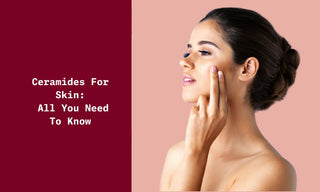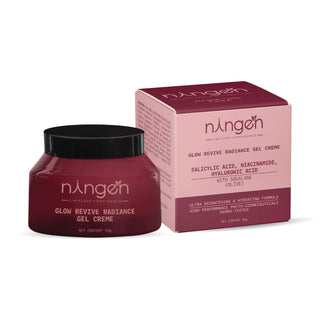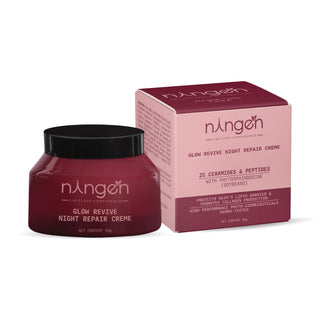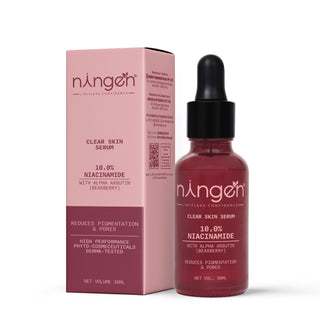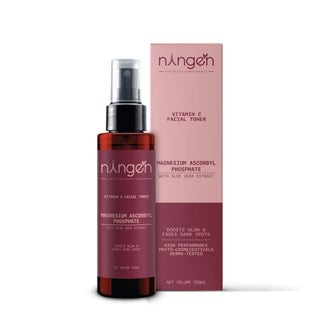Want to keep your skin looking its best? Ceramides are the way to go.
Ceramides are like the natural glue that holds your skin cells together. Imagine your skin as a brick wall, where the skin cells are the bricks, and ceramides are the mortar in between. They help keep your skin strong and intact. This "glue" is crucial because it locks in moisture, keeping your skin hydrated and smooth, and also protects against irritants and pollution. Without enough ceramides, your skin can become dry, flaky, and more prone to irritation. By replenishing ceramides, either through skincare products or naturally, you help maintain a healthy, protective skin barrier. In this blog, we'll break down everything you need to know about ceramides and how they can improve your skincare routine.
What Are Ceramides?
Ceramides are natural fats found in your skin that help keep it healthy and moisturized. They act like glue, holding your skin cells together to create a strong barrier. This barrier keeps moisture in and protects against dryness and irritation. If you have enough ceramides, your skin stays smooth and hydrated.
Scientifically, Ceramides are a family of lipid molecules that are a crucial component of the stratum corneum, the outermost layer of the skin. They are sphingolipids, which consist of a sphingosine backbone linked to a fatty acid. Ceramides play a vital role in the skin's barrier function by helping to form a water-impermeable, protective layer that reduces moisture loss and protects against environmental stressors, such as pollutants and bacteria.
In the skin, ceramides account for approximately 50% of the lipids in the stratum corneum. They are organized in a bilayer structure, where they work alongside cholesterol and free fatty acids to maintain the integrity and permeability of the skin barrier. This barrier prevents transepidermal water loss (TEWL), ensuring that the skin remains hydrated and resilient.
A deficiency in ceramides can lead to various skin disorders, including dryness, dermatitis, and increased sensitivity. Therefore, replenishing ceramides through skincare products can help restore and maintain the skin's barrier function, promoting healthier, more hydrated skin.

Types of Ceramides
Ceramides are a family of waxy lipid molecules found within the skin cells that play a crucial role in determining the skin's barrier function. They are naturally occurring fats that makeup over 50% of the skin's composition. There are nine types of ceramides in the skin, numbered from 1 to 9, and they are commonly referred to as Ceramide NP, AP, EOP, NS, AS, NG, EOS, NP, and NE. Each type has a slightly different structure and function, working in harmony to maintain the skin's moisture levels and protect against environmental damage.

Ceramides are categorized based on their head groups and fatty acid chain lengths. Natural ceramides are found in high concentrations in the outermost layer of the skin, known as the stratum corneum. In skincare products, ceramides are sourced either naturally, from plant-derived oils, or synthetically manufactured to mimic natural ceramide structures. These ingredients are added to skincare products to replenish the skin's ceramide levels, thus reinforcing the skin's natural protective barrier against moisture loss and external irritants.
|
Fatty Acid/Sphingoid |
Non-hydroxy fatty acid [N] |
A-hydroxy fatty acid [A] |
Esterified w-hydroxy fatty acid [ΕΟ] |
|
Dihydrosphingosine [DS] |
Ceramide NDS (aka Ceramide 10) |
Ceramide ADS (aka Ceramide 11) |
Ceramide EODS (aka Ceramide 12) |
|
Sphingosine [S] |
Ceramide NS (aka Ceramide 2) |
Ceramide AS (aka Ceramide 5) |
Ceramide EOS (aka Ceramide 1) |
|
Phytosphingosine [P] |
Ceramide NP (aka Ceramide 3) |
Ceramide AP (aka Ceramide 6) |
Ceramide EOP (aka Ceramide 9) |
|
6-hydroxy sphingosine [H] |
Ceramide NH (aka Ceramide 8 |
Ceramide AH (aka Ceramide 7) |
Ceramide EOH (aka Ceramide 4) |
Importance of Ceramides in The Skin
Ceramides play a crucial role in maintaining the integrity and hydration of the skin. Found naturally within skin cells, they are essential fatty acids that contribute to the protective barrier function of the skin. By preserving this barrier, ceramides help to prevent moisture loss and shield the skin from environmental aggressors.
The outermost layer of skin, known as the stratum corneum, is where ceramides, along with other lipids like cholesterol and free fatty acids, form a lipid layer that locks in moisture and maintains skin hydration. When ceramide levels are adequately maintained, they help to ensure a healthy skin barrier, which can prevent dry, itchy skin and other skin conditions.
For individuals with Dry Skin or Sensitive Skin, utilizing skincare products enriched with natural or synthetic ceramides can be particularly beneficial. Incorporating ceramides into daily skin care routines supports the skin’s barrier function, promoting overall skin health. A healthy skin barrier equates to a reduction in Acne-Prone Skin issues and enhances the skin's ability to retain moisture, resulting in hydrated, resilient skin.
How Age Affects Ceramide Levels
As we age, our skin undergoes numerous changes, one of which is the alteration of ceramide levels. Ceramides are lipids that play a crucial role in maintaining the skin's protective barrier and are essential for skin health. They are found naturally in the uppermost layers of skin and help retain moisture to keep skin hydrated and supple.
Table: Age-Related Changes in Ceramide Levels
|
Age Group |
Ceramide Levels |
Impacts on Skin |
|
Children/Young Adults |
High |
Robust, hydrated skin |
|
Middle Age |
Begin to Decline |
Increased dryness, fine lines |
|
Elderly (60+) |
Significantly Lower |
Dry, itchy skin; pronounced wrinkles |
From childhood to early adulthood, our skin typically maintains high levels of ceramides, contributing to a healthy skin barrier and hydration. As we transition into middle age, these ceramide levels begin to decrease, leading to the skin becoming more prone to dryness and the development of fine lines and wrinkles. Upon reaching the elderly phase of 60 years and above, ceramide levels are significantly lower, which further weakens the skin barrier, resulting in drier, more itchy skin, as well as more pronounced wrinkles and susceptibility to various skin conditions.
Maintaining ceramide levels through a targeted skincare routine can help mitigate the effects of aging, ensuring the skin remains healthy and its barrier function intact.
Effects of Decreased Ceramide Levels
Decreased ceramide levels in the skin can have various effects on skin health and its ability to function as a protective barrier. Ceramides, a type of lipid found within the skin cells in the outermost layer of skin, play a crucial role in maintaining skin hydration and barrier function. When ceramide levels drop, several issues can arise, including:
- Dry Skin: Reduced ceramide levels lead to impaired moisture retention, resulting in a drier skin texture.
- Compromised Skin Barrier: Ceramides contribute to the protective barrier that shields the skin from environmental stressors. Low levels can weaken this barrier, making the skin more susceptible to irritants.
- Increased Sensitivity: Skin may become more sensitive and reactive without sufficient ceramides to fortify the skin barrier.
- Eczema and Itchy Skin: Certain skin conditions, such as eczema, are associated with lower ceramide levels, which can cause itchy and inflamed skin.
- Visible Signs of Aging: Ceramides help to keep the skin plump and retain moisture; a decrease may lead to the appearance of fine lines and wrinkles.
Incorporating skincare products with synthetic or natural ceramides can help to replenish the skin's ceramide content, thus maintaining a healthy skin barrier and improving overall skin health.
Benefits of Ceramides For The Skin
Ceramides, natural lipids in the skin, act as essential building blocks for a strong and resilient skin barrier. Their ability to support skin’s structure and retain moisture is what makes them a sought-after ingredient in many skincare routines. Here’s a look at the multifaceted benefits of ceramides for the skin.
Strengthening the skin barrier
The skin barrier, or the stratum corneum, is the outermost layer of skin that serves as the frontline defense against external aggressors. Ceramides fill in the spaces between skin cells to reinforce the skin's protective barrier. When ceramide levels are optimal, the barrier is better able to prevent the penetration of harmful irritants and pathogens, thus contributing to overall skin health and resilience. This is particularly beneficial for those with Sensitive Skin, who require extra barrier support to minimize reactivity.
Locking in moisture
Ceramides are renowned for their moisture-retention capabilities. By creating a seal on the skin’s surface, they effectively prevent transepidermal moisture loss, keeping skin hydrated and supple. This property is especially advantageous for individuals grappling with Dry Skin issues. Regular use of skincare products infused with ceramides helps to sustain skin hydration, leaving it feeling soft and eliminating tightness or flakiness associated with dehydration.
Repairing and protecting against damage
Skin cells are constantly exposed to potential damage from environmental factors such as UV radiation, pollution, and harsh weather conditions. Ceramides play a defensive role in assisting skin cells to repair and protect against such damage. By restoring the integrity of the skin barrier function, ceramides help to minimize the effects of environmental stress, which can subsequently reduce the likelihood of developing certain skin conditions.
Encouraging healthy aging
Aging skin naturally experiences a decline in ceramide levels, leading to a compromised skin barrier and increased susceptibility to the signs of aging, such as wrinkles and loss of firmness. By boosting the skin with ceramide-rich skincare products, you can help to restore a healthy skin barrier function. Ceramides support skin’s elasticity and firmness, which in turn, can mitigate the visual impact of aging and foster the maintenance of a youthful appearance.
Strengthening the skin barrier
Strengthening the skin barrier is essential for maintaining healthy skin and preventing various skin conditions. The barrier function of the outermost layer of skin, known as the stratum corneum, relies on a composition of lipids, including ceramides, cholesterol, and free fatty acids.
Locking in moisture
Ceramides are essential fatty acids that keep the skin hydrated and protect it from pollutants and irritants. Found in the skin's outer layer, they are crucial for maintaining a healthy skin barrier. For those with dry or sensitive skin, using skincare products with ceramides helps prevent moisture loss and protect against skin conditions. These products, whether natural or synthetic, lock in moisture, restore the skin barrier, and alleviate itchy skin, making ceramides invaluable for overall skin health.
Repairing and protecting against damage
Ceramides are essential lipids in the outermost skin layer, acting like mortar between bricks to maintain the skin barrier and prevent moisture loss. As we age or face harsh conditions, ceramide levels drop, leading to dry, sensitive skin and increased damage. Incorporating ceramides from foods like sweet potatoes or topical products helps replenish these lipids, restoring the skin barrier, maintaining hydration, and promoting healthy skin. Regular use of ceramide-infused products improves skin texture, enhances defense against damage, and ensures a resilient skin barrier to withstand environmental stressors.
Smoothing the skin's texture
Ceramides are essential lipids in the outermost skin layer, crucial for maintaining a healthy skin barrier and smooth texture. They prevent moisture loss and shield against environmental aggressors. Individuals with dry or sensitive skin often have lower ceramide levels, leading to issues like itchy skin. Using skincare products with ceramides can replenish these lipids, supporting barrier function and hydration. Including ceramide-rich products in both morning and evening routines, along with a diet that supports ceramide production, can benefit all skin types, including acne-prone skin. Ceramides help improve overall skin texture, protect against damage, and promote long-term skin health.
How to Recover The Ceramide Loss?
When ceramide levels decline—be it due to aging, harsh skincare practices, or certain skin conditions—the skin may become dry, sensitive, and more prone to irritation. Recovering this ceramide loss involves a combination of external and internal approaches that restore the natural balance of your skin's barrier. It is important to integrate products with ceramides into your skincare routine, as well as consider dietary adjustments to support the skin from within.
Topical Application of Ceramides
Applying ceramides topically is an effective way to restore the protective barrier of the skin. Topical ceramides can be found in an array of skincare products such as creams, lotions, serums, and ointments. These products work by supplementing the skin's natural ceramides, helping to keep the skin hydrated and reducing moisture loss. When choosing a topical product, look for those that contain a combination of ceramides, fatty acids, and cholesterol for optimal barrier repair. Consistent use as part of your daily skincare routine can lead to an improvement in skin hydration, texture, and relief from itchy or dry skin.
Benefits of Topical Ceramides:
- Reinforces skin barrier
- Reduces moisture loss
- Enhances skin hydration
- Alleviates dry and itchy skin
- Supports a healthy skin barrier
Oral Consumption of Ceramides
Ceramide levels can also be enhanced by oral consumption through diet or dietary supplements. Foods rich in ceramides or that promote ceramide production include sweet potatoes, wheat germ, brown rice, and dairy products. Additionally, supplements available in the form of capsules or powders may contain plant-derived or synthetic ceramides that can support skin health when taken regularly. However, it is vital to consult a healthcare provider before starting any new supplement regimen to ensure it is appropriate for your specific health needs and does not interfere with other medications.
Skincare Products With Ceramides
Ceramides are essential lipids in skin cells, crucial for maintaining a healthy skin barrier. They help retain moisture and protect against environmental aggressors. Skincare products with ceramides boost natural ceramide levels, which diminish due to aging or skin conditions.
Types of Skincare Products With Ceramides
Ceramides are lipid molecules that play an essential role in maintaining the skin's protective barrier. These naturally occurring substances are critical in keeping skin hydrated and healthy. As the understanding of ceramides' benefits has grown, numerous skincare products have been formulated to include either natural or synthetic ceramides to cater to various skin types and conditions.
Types of Skincare Products with Ceramides:
- Moisturizers: Often cream-based, these aim to reduce moisture loss, especially for dry skin.
- Serums: Lightweight and potent, serums with ceramides can deeply nourish the skin.
- Cleansers: Gentle on the skin barrier, ceramide-infused cleansers avoid stripping the skin of its natural oils.
- Toners: Designed to balance the skin's pH levels while offering a hydrating effect.
- Lotions: Similar to moisturizers but with a lighter consistency, suitable for acne-prone or sensitive skin.
- Sunscreen: Some sunscreens include ceramides to protect while reinforcing the skin barrier against UV damage.
- Night Creams: Intended for overnight use to restore ceramide levels and skin barrier function while you sleep.
Choosing the Right Products For Your Skin Type
When choosing skincare products, it’s important to consider your skin type as this affects how your skin interacts with different ingredients.
- Dry Skin: Look for products with hydrating components such as hyaluronic acid and ceramides to maintain skin hydration and repair the skin barrier to prevent moisture loss.
- Sensitive Skin: Choose products free from irritants like alcohol, fragrances, and harsh chemicals. Ingredients that soothe and fortify the protective barrier are key.
- Oily or Acne-Prone Skin: Non-comedogenic items are essential to avoid clogging pores. Salicylic acid and benzoyl peroxide can help manage acne while maintaining a healthy skin barrier is important.
- Combination Skin: This type involves managing dry and oily areas separately, often requiring a mix of products to balance skin hydration and oil control.
Always patch-test a small area when trying new products to ensure no adverse reactions occur. Read ingredient labels and choose based on your skin’s needs.
|
Skin Type |
Ingredients to Look For |
Ingredients to Avoid |
|
Dry Skin |
Ceramides, Glycerin, Fatty Acids |
Alcohol, Fragrance |
|
Sensitive Skin |
Aloe Vera, Niacinamide |
Parabens, Artificial Dyes |
|
Acne-Prone Skin |
Salicylic Acid, Zinc |
Oils, Silicones |
|
Combination Skin |
Hyaluronic Acid, Green Tea |
Sulfates, Synthetic Dyes |
Incorporating products with ceramides into your skincare routine can support skin health across various skin types by reinforcing the skin barrier and promoting healthy skin hydration.
Potential Side Effects of Ceramide Products
Ceramides play a crucial role in maintaining skin barrier function and keeping skin hydrated. They are naturally occurring fatty acids found within skin cells, particularly in the outermost layer of skin. While ceramides are generally well tolerated, especially when naturally present in the body, the use of topical ceramide products can lead to potential side effects, although these are relatively rare.
Potential Side Effects of Ceramide Products:
- Irritation and Redness: Individuals with very sensitive skin may experience irritation or a slight redness upon the initial application of ceramide-infused skincare products.
- Allergic Reactions: Some ceramide formulations may contain other ingredients that can cause allergic reactions. This can manifest as itching, swelling, or hives.
- Breakouts: Those with Acne-Prone Skin have reported experiencing breakouts when using certain ceramide products, likely due to the addition of other comedogenic substances rather than the ceramides themselves.
- Over-moisturization: Overuse of ceramide products, particularly in those with oily or combination skin types, can lead to a feeling of heaviness and might contribute to an overly moisturized skin surface, hampering the natural balancing of oils.
The Bottom Line
I hope you found this article “Ceramides For Skin: All You Need To Know “helpful. Ceramides are essential for maintaining healthy, hydrated skin and a robust protective barrier. As natural lipids, they help lock in moisture, protect against environmental stressors, and support the skin's structure. Incorporating ceramide-rich products into your skincare routine can mitigate the effects of aging, dryness, and sensitivity. By understanding the importance of ceramides, you can make informed decisions to enhance your skin's health and appearance.
Quick View
Ceramides are natural fats crucial for skin hydration and barrier function. They act as glue between skin cells, preventing moisture loss and protecting against irritants. There are various types of ceramides, and their levels decline with age, leading to dryness and sensitivity. Using ceramide-infused skincare products or supplements can help replenish these essential lipids, promoting healthier, more resilient skin. This guide covers the types of ceramides, their benefits, the impact of aging, and tips for choosing the right products for your skin type.
Frequently Asked Questions
Q1. Are there different types of ceramides?
Yes, there are nine types, each with a unique structure and function, working together to maintain skin health.
Q2, How can I incorporate ceramides into my skincare routine?
You can use ceramide-rich products like moisturizers, serums, and cleansers, or take supplements to boost ceramide levels.
Q3. Are there any side effects of using ceramide products?
Generally, ceramides are well-tolerated, but some people may experience mild irritation or allergic reactions.
Q4: Can ceramides help with aging skin?
Yes, they help restore the skin barrier and retain moisture, reducing the appearance of fine lines and wrinkles.
Q5. What should I look for in a ceramide skincare product?
Look for products that combine ceramides with other lipids like cholesterol and fatty acids for optimal barrier repair.
Q6. Does everyone benefit from ceramide skincare products?
Yes, ceramides are beneficial for all skin types, including dry, sensitive, oily, and com
Q7. What are ceramides?
Ceramides are natural fats found in the skin that help maintain moisture and protect against environmental damage.
Q8. Why are ceramides important for the skin?
They act as the "glue" that holds skin cells together, keeping the skin barrier strong and preventing moisture loss.
Q9. How do ceramide levels change with age?
Ceramide levels naturally decrease with age, leading to drier, more sensitive skin and increased signs of aging.
Q10. Can ceramides help with dry skin?
Yes, ceramides are highly effective at locking in moisture and maintaining hydration, making them ideal for dry skin.


